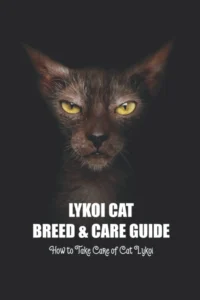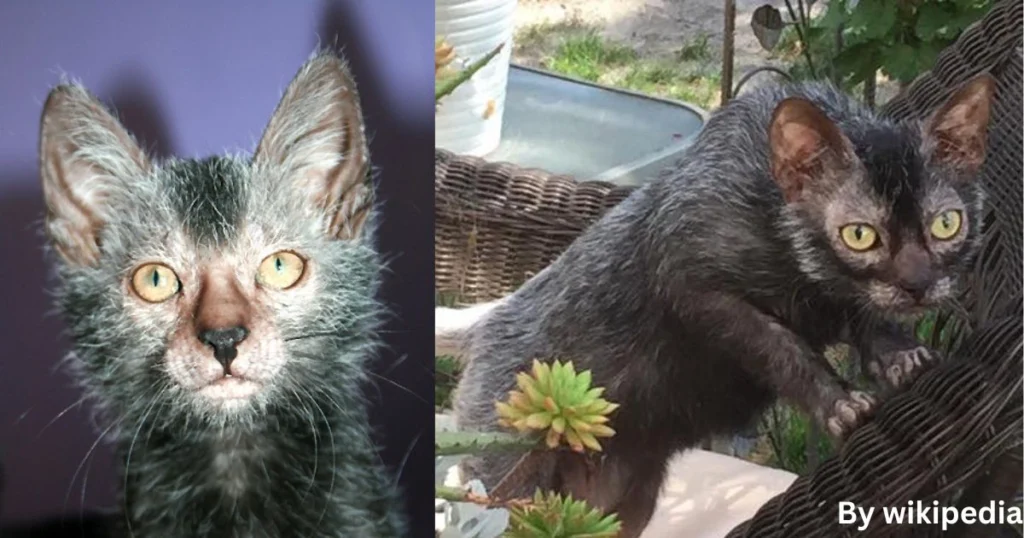What Is a Lykoi Cat ? Discover the Unique Appearance and Personality of This Rare Breed
Table of Contents
When you enter the world of exotic cats, the Lykoi cat stands out. Known as the “werewolf cat,” they have a unique look. Their partially hairless coats and wolf-like features have won many hearts. Let’s explore the Lykoi’s origins, characteristics, and charming personalities.
The Lykoi’s striking look comes from a natural genetic mutation. This gives them a wild and mysterious appearance. They weigh between 8 to 13 pounds, have muscular builds, wide-set eyes, and pointy ears. Their 10 to 15 year lifespan shows their resilience and longevity.
The Lykoi cat’s personality is just as captivating. They are friendly, outgoing, and often called “doglike.” These cats love human interaction and form strong bonds with their families. If you’re looking for a unique pet or just want to see the wonders of cats, the Lykoi will impress you.
What Defines a Lykoi Cat?
The Lykoi cat is a unique feline breed that has caught the eye of cat lovers everywhere. It started from a natural change in domestic shorthair cats. Patti Thomas and Dr. John Gobble created the breed in 2011 in the United States. Lykoi cats stand out with their Feline Breed features like partial hairlessness, a roan coat, and a “werewolf-like” look.
Origin and History
The Lykoi breed has an interesting story. It took 20 years to develop, starting in Vonore, Tennessee. These cats are different from the Canadian Sphynx and don’t share the same hairless gene.
Breed Characteristics
Lykoi cats are medium-sized with a wedge-shaped head and striking golden or green eyes. As they get older, they shed a lot, but their hair can grow back later in the year. This Natural Mutation in their coat makes them special.
The name “Lykoi” comes from the Greek word for “wolf.” It shows their wolf-like look because of their missing coats. Breeders work hard to keep the Lykoi Cat Breeding program diverse and avoid too much inbreeding.
“The Lykoi breed is truly one-of-a-kind, with its captivating appearance and fascinating history. These cats are a remarkable example of the natural diversity within the feline world.”
Distinctive Physical Features of Lykoi Cats
Lykoi cats, also known as “werewolf cats,” have a unique and captivating look. They stand out from other domestic cat breeds with their special features.
Unique Coat
The Lykoi cat’s most striking feature is its partially hairless coat. It shows a roan pattern of white and pigmented hairs. They lack an undercoat, except around the eyes, muzzle, and feet, making their coat coarse and wiry.
Interestingly, their coat can change patterns after shedding. This adds to their mystical allure.
Eye Color
Lykoi cats have large, expressive eyes. Their eyes can be amber or vibrant green. Their eyes look round and prominent, making them look wolf-like.
Facial Structure
The Lykoi cat’s facial structure is very distinctive. They have a hairless “mask” around the eyes, nose, and mouth. This, along with their pointed ears and lean bodies, gives them a werewolf-like look. Despite their coarse-looking fur, their coats are surprisingly soft.
In summary, Lykoi cats have unique physical features. These include their coat, eye color, and facial structure. These unusual pets are sure to capture the attention of any cat enthusiast.
Lykoi Cat Personality Traits
Lykoi cats have a unique personality that is both playful and affectionate. They have a charm that makes them stand out from other breeds.
Playful Nature
Lykoi cats are known for their playful and energetic nature. They often act like dogs, wagging their tails and playing with others. These smart cats love to learn tricks and explore their surroundings with excitement.
Affectionate Behavior
At first, Lykoi cats may seem shy around strangers. But they quickly bond with their families. They love attention and enjoy being close to their owners. These cats are loyal and always looking for a cuddle or a head scratch.
Social Interaction
Lykoi cats are social and get along well with other pets. However, they have a strong prey drive. So, it’s important to introduce them carefully to small animals or children. Despite their independent streak, they love to be around people, making them great pet companions.
“Lykoi cats are truly one-of-a-kind, with a personality that captivates and delights. Their playful nature and affectionate behavior make them wonderful feline companions.”
- Lykoi cats are known for their cat behavior that is a unique blend of playfulness and affection.
- These cats have a strong feline personality, exhibiting both independent and social tendencies.
- Lykoi cats make excellent pet companions for families and individuals who appreciate their engaging and adaptable nature.
Health Considerations for Lykoi Cats
Lykoi cats are a rare and unique breed that needs special care for their health. They are generally healthy but can face certain Cat Health issues. These issues are linked to their distinctive coat and physical traits.
Common Health Issues
Lykoi cats are more likely to get skin infections and allergies than other cats. Their thin coat makes them more susceptible to sunburn and skin cancer. They also might get arthritis if they have achondroplastic dwarfism.
Because of their thin coat, Lykoi cats struggle to keep warm and can get hypothermia. It’s vital to take them to a Veterinary Care professional regularly. This helps catch and treat any skin or temperature problems early.
Regular Veterinary Care
- Lykoi cats are generally healthy due to “hybrid vigor.” But, they still need regular check-ups and Pet Wellness care.
- It’s important to keep them up to date on vaccinations and prevent parasites. Also, watch for common feline diseases like kidney issues, hyperthyroidism, and arthritis.
- They might need special care, like regular skin checks and grooming. This helps keep their unique coat in good shape and prevents infections.
- Even though they live as long as most cats, more research is needed on their long-term health.
By giving Lykoi cats the right Veterinary Care and meeting their Pet Wellness needs, owners can help them live a happy and healthy life.
Caring for Your Lykoi Cat
Lykoi cats have a wolf-like look and need special care. They require attention to stay healthy. Knowing their needs is key for pet owners.
Grooming Needs
Lykoi cats have a unique coat that needs regular grooming. They shed a lot, especially 2-3 times a year. Their skin can get oily.
To keep their coat in good shape, brush them weekly and bathe them monthly. Don’t forget to trim their nails, clean their ears, and brush their teeth.
Diet and Nutrition
Good Feline Nutrition is vital for Lykoi cats. They need a high-quality Cat Care diet rich in protein. This supports their active lifestyle.
Make sure they always have fresh water. Adjust their food based on their age, weight, and activity level. This keeps them healthy.
| Breed Characteristic | Rating |
|---|---|
| Grooming Needs | 1/5 |
| Shedding | 4/5 |
Understanding their grooming and dietary needs helps Lykoi cats thrive. Pet owners can ensure they live a long, healthy life.
Ideal Living Conditions for Lykoi Cats
Lykoi cats are special with their looks and personalities. They need a home that meets their needs. As indoor pets, they do well in many places but need certain things for comfort.
Space Requirements
Lykoi cats fit into different homes, big or small. They love to climb and explore. So, it’s important to have vertical scratching posts, cat trees, and high places for them.
These spots let them climb and feel safe. It’s like having their own territory.
Interaction and Stimulation
Lykoi cats are full of energy and always curious. They need fun activities every day. Toys, puzzle feeders, and playtime with you are great for them.
Also, a safe outdoor area can be good for them. It lets them explore and be natural.
Because they have a thin coat, Lykoi cats get cold or hot easily. They need warm spots in winter and cool places in summer. This keeps them happy and healthy indoors.
“Lykoi cats are best suited as indoor pets due to their sensitivity to temperature extremes. They adapt well to various living spaces but require vertical climbing areas and scratching posts.”
Lykoi Cat Behavior and Training
Lykoi cats are known for their unique looks and playful nature. They are smart and can learn many tricks, like fetching and walking on a leash. To train them well, use positive reinforcement techniques that reward good behavior.
Training Techniques
Lykoi cats love praise, treats, and affection. Use clicker training or other reward-based methods to teach them new things. Be patient and consistent, as they can be a bit mischievous and need gentle guidance during training.
Socialization Tips
- Introduce your Lykoi cat to different people, pets, and places early on. This helps them become well-rounded and confident.
- Slowly introduce them to new sights, sounds, and experiences. Let them explore at their own pace and make sure they have positive experiences.
- Make sure they get plenty of playtime and interaction. This helps keep their curious and energetic nature in check and prevents behavioral problems.
Lykoi cats are intelligent and loving, making great companions. By focusing on their training and socialization, you’ll have a rewarding relationship with your unique feline friend.
| Cat Training | Pet Behavior | Feline Socialization |
|---|---|---|
| Positive reinforcement techniques | Curious and energetic nature | Introducing to new experiences |
| Clicker training | Mischievous streak | Developing confidence |
| Consistent training sessions | Reward-based learning | Preventing behavioral issues |
“With their intelligent and affectionate personalities, Lykoi cats can make wonderful companions when their training and socialization needs are met.”
Myths and Misconceptions about Lykoi Cats
Lykoi cats have a werewolf-like look that often leads to misunderstandings. Let’s clear up the common myths and misconceptions about this unique Cat Breed.
Debunking Common Myths
Many think Lykoi cats are hypoallergenic. But, they produce dander like other cats and can cause allergies in some. Another myth is they’re related to the Sphynx breed. Actually, they’re not genetically connected to the Sphynx. Their unique look comes from a natural genetic mutation.
Lykoi cats are not aggressive or feral. They’re domestic cats with normal behaviors and temperaments. Their wild look is just a breed characteristic, not a sign of danger.
Understanding the Truth
- Lykoi cats have fewer health problems than many purebreds, thanks to their genetic diversity.
- They might be more likely to get Lymphocytic Mural Folliculitis because of fewer hair follicles. But, they’re generally healthy.
- Because they have less skin, Lykoi cats can get sunburned easily. They need extra care and protection from the sun.
- Black-colored Lykoi cats are especially expressive, showing off their unique facial features.
By learning the real nature and traits of Lykoi cats, we can enjoy their Animal Facts. We can also debunk the common Pet Myths that surround this fascinating breed.
Where to Find a Lykoi Cat
Finding a Lykoi cat is a bit of a challenge. They are a rare breed with only about 100 registered worldwide. Your best bet is to find reputable breeders who specialize in these unique cats.
Reputable Breeders
Reputable Lykoi cat breeders are your best source. Prices for a kitten can range from $1,500 to $2,500. This depends on the cat’s lineage and looks. Make sure to check the breeder’s credentials and their commitment to ethical breeding.
Adoption Options
Lykoi cats might show up in shelters or rescue groups. This is rare, but it can happen. If you’re interested in adopting an adult Lykoi, you might find one. Be ready for a detailed screening process. With patience, you could bring a Lykoi cat into your home.
FAQ
What is a Lykoi cat?
Lykoi cats, also known as “werewolf cats,” have a unique look. They have a natural genetic mutation. This gives them a wild, grizzled look with a partially hairless coat and a roan pattern.
What are the origins and history of the Lykoi cat breed?
Lykoi cats started from a natural mutation in domestic shorthair cats. Patti Thomas and Dr. John Gobble established the breed in 2011. They were recognized by TICA in 2012 and CFA in 2018.
What are the physical characteristics of Lykoi cats?
Lykoi cats are medium-sized, weighing 8-13 pounds. They have wide-set eyes, pointy ears, and a muscular body. Their coat is partially hairless with a roan pattern, changing after shedding. They have striking golden or green eyes.
What is the personality of Lykoi cats?
Lykoi cats are playful, intelligent, and affectionate. They act like dogs, wagging their tails and showing pack mentality. They are curious and love to learn tricks.
What health considerations are important for Lykoi cats?
Lykoi cats are generally healthy but have skin sensitivities and sunburn risks. They may get ear infections and are sensitive to cold.
How do you care for a Lykoi cat?
Lykoi cats need weekly brushing and monthly baths. Their diet should be high-quality and rich in protein. Adjust it based on their age, weight, and activity level.
What are the ideal living conditions for Lykoi cats?
Lykoi cats prefer indoor living due to temperature sensitivity. They adapt to various spaces but need vertical areas and scratching posts. They also need interactive play and stimulation.
How can you train and socialize a Lykoi cat?
Lykoi cats are smart and easy to train with positive reinforcement. Early socialization is key for their development. They are curious and quick to learn but may get into mischief.
Are there any myths or misconceptions about Lykoi cats?
Some think Lykoi cats are hypoallergenic or related to Sphynx cats. But they’re not. Their werewolf-like look is natural, not due to illness or poor breeding.
Where can you find a Lykoi cat?
Lykoi cats are rare, with only about 100 worldwide. You can find them through reputable breeders, who charge
FAQ
What is a Lykoi cat?
Lykoi cats, also known as “werewolf cats,” have a unique look. They have a natural genetic mutation. This gives them a wild, grizzled look with a partially hairless coat and a roan pattern.
What are the origins and history of the Lykoi cat breed?
Lykoi cats started from a natural mutation in domestic shorthair cats. Patti Thomas and Dr. John Gobble established the breed in 2011. They were recognized by TICA in 2012 and CFA in 2018.
What are the physical characteristics of Lykoi cats?
Lykoi cats are medium-sized, weighing 8-13 pounds. They have wide-set eyes, pointy ears, and a muscular body. Their coat is partially hairless with a roan pattern, changing after shedding. They have striking golden or green eyes.
What is the personality of Lykoi cats?
Lykoi cats are playful, intelligent, and affectionate. They act like dogs, wagging their tails and showing pack mentality. They are curious and love to learn tricks.
What health considerations are important for Lykoi cats?
Lykoi cats are generally healthy but have skin sensitivities and sunburn risks. They may get ear infections and are sensitive to cold.
How do you care for a Lykoi cat?
Lykoi cats need weekly brushing and monthly baths. Their diet should be high-quality and rich in protein. Adjust it based on their age, weight, and activity level.
What are the ideal living conditions for Lykoi cats?
Lykoi cats prefer indoor living due to temperature sensitivity. They adapt to various spaces but need vertical areas and scratching posts. They also need interactive play and stimulation.
How can you train and socialize a Lykoi cat?
Lykoi cats are smart and easy to train with positive reinforcement. Early socialization is key for their development. They are curious and quick to learn but may get into mischief.
Are there any myths or misconceptions about Lykoi cats?
Some think Lykoi cats are hypoallergenic or related to Sphynx cats. But they’re not. Their werewolf-like look is natural, not due to illness or poor breeding.
Where can you find a Lykoi cat?
Lykoi cats are rare, with only about 100 worldwide. You can find them through reputable breeders, who charge $1,500 to $2,500. Sometimes, they show up in shelters or rescues.
,500 to ,500. Sometimes, they show up in shelters or rescues.

Lykoi Cat Breed & Care Guide: How to Take Care of Cat Lykoi: How to Take Care of Cat Lykoi

